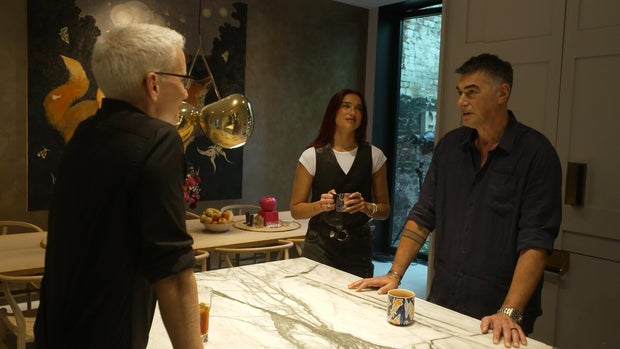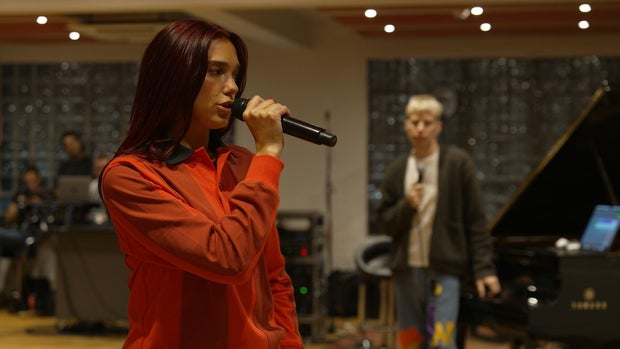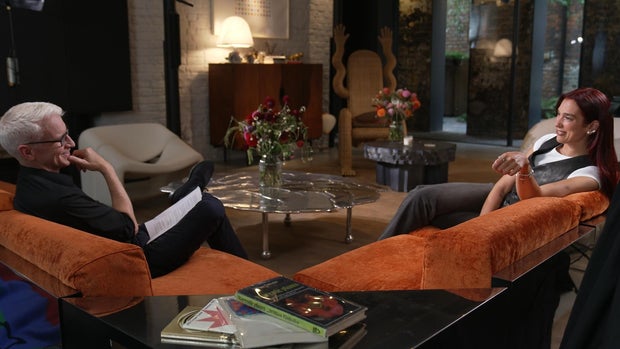CBS News
How Dua Lipa manifested her Glastonbury headlining dream | 60 Minutes

When Dua Lipa took the stage as the headliner of the Glastonbury music festival in England this summer, it was a far cry from her early gigs performing for crowds of 10 – but it was something she envisioned for years.
A crowd of around 100,000 packed a field and sang to dance hits along with Lipa on a Friday night — the very night she’d dreamed of playing the festival. Her dream plans specified a Friday set so that she could spend the rest of the weekend partying.
“You gotta be specific about your dreams,” the singer told 60 Minutes.
Dua Lipa’s path to pop stardom
The 29-year-old singer has worked hard to make those dreams a reality. Lipa, whose first name means love in Albanian, was born in London. Her parents moved there from Kosovo after the war in Bosnia broke out in 1992. She started singing lessons at 9, but her family returned to Kosovo when she was 11. Four years later she decided to go back to Britain to become a pop star. The first challenge for the teen was convincing her parents.
She told them she wanted to go to high school in England so that she could go to a British university. Her parents bought the pitch, dad Dukagjin Lipa, who is now her manager, said. She was very mature and confident as a teen.
60 Minutes
“I think more confident than I am now, for sure,” Lipa said.
Once in London, she immediately started recording cover songs and posting the videos on YouTube. Lipa was living with a family friend, but was pretty much on her own. She skipped school so often that she flunked out. Lipa remembers calling her parents to tell them the news.
“And they’re like, ‘OK. Well, you did this. Find yourself a school or you’re going to come back to Kosovo,'” Lipa said.
She made it happen and graduated, but decided college could wait because just three years after leaving Kosovo, Lipa defied the odds and got a record deal with Warner Brothers.
Dua Lipa’s “New Rules” lead to new success
Her cover songs got her attention, but there was a lot involved with making it big that Lipa was unfamiliar with.
“I walked in with a dream of, ‘I want to sing. I want to perform. I want to write.’ But I had no idea of what comes with it, or what other things I have to do, or even what goes into the promotion of a record,” she said.
Lipa performed wherever she could while working on her first album. Some nights only 10 people would be in the audience. They’d been promised a drink to come and watch.
“We were doing really small shows, where the stage was like a step above the floor,” Lipa said.
Everything changed in 2017 when Lipa’s first album came out and she made a music video for “New Rules” in a Miami hotel. It became her first major U.S. hit.
Her self-titled album won her two Grammys — one of them for Best New Artist.
From “give us nothing” to “Quarantine Queen”
But it was a different award show that marked another turn in her career. When she sang “New Rules” at the Brit Awards on live TV in 2018, the reviews were positive. Some viewers’ comments online, however, weren’t exactly kind.
One in particular went viral: “I love her lack of energy. Go girl, give us nothing.”
The viral meme mocking Lipa’s stage presence and performance ability spread like wildfire, igniting a different sort of fire in Lipa.
“I was like, ‘All right. Well, I’m just gonna prove to you [that] I can perform, and I can dance and I can do all these things,'” Lipa said.
60 Minutes
She released her second album, “Future Nostalgia,” in March of 2020 as the world was locked down during the COVID pandemic. It wasn’t clear if anyone would want to listen to dance music or how Lipa could promote the album.
It ended up working out for her. The new album was an extraordinary success – commercially and critically. Billboard, Rolling Stone and others called it one of the best of the year, and Dua Lipa was dubbed “the Quarantine Queen.”
“It didn’t end up being, you know, the night club experience, but it ended up being the kitchen dance parties,” Lipa said. “The soundtrack to people’s workouts at home, to kind of keep them sane during that time.”
It’s the kind of music she loves, even though she knows there’s some stigma around dance music as a genre.
“You’re always met with some kind of pushback as a female artist if you’re not, like, with a guitar or with a piano,” she said. “Just like, ‘Oh, she can’t sing. Oh, it’s all processed. Oh, it’s this, oh it’s whatever.'”
Lipa has also faced some criticism for not pouring out her innermost fears, desires and wants in her music. She said those are things she naturally holds back.
60 Minutes
“Some people are just so ruthless with their own private life that they decide to put it all out in a song, because they know that it’s going to attract people’s attention,” she said. “For me, it was always important to make music that people really loved. Not because I was putting someone out on blast, or not because I’m doing it for the clickbait.”
Responding to criticism outside the music world
Dua Lipa’s music may not be controversial, but some statements she’s made over the past few years about Israel have been. She’s called the current war in Gaza genocide, and in 2021 a well-known rabbi took out a full page ad in the New York Times criticizing her.
“There was a lot of, you know, words kind of thrown at me,” Lipa said about the ad. “Things that I don’t believe represent who I am or what I believe in at all. Like I’ve always only ever wanted peace, really.”
She said she feels she was treated unfairly, but won’t let it hold her back from talking about things she believes in.
Whatever Dua Lipa’s political or personal opinions may be, you won’t find them in her music. She says she just wants to lift people up, get them out and maybe take a spin on the dance – or kitchen – floor.
CBS News
Ritchie Boys | 60 Minutes Archive

Watch CBS News
Be the first to know
Get browser notifications for breaking news, live events, and exclusive reporting.
CBS News
The significance of U.S. officials in Syria amid search for Austin Tice

Watch CBS News
Be the first to know
Get browser notifications for breaking news, live events, and exclusive reporting.
CBS News
The Iron River | Sunday on 60 Minutes

Watch CBS News
Be the first to know
Get browser notifications for breaking news, live events, and exclusive reporting.







